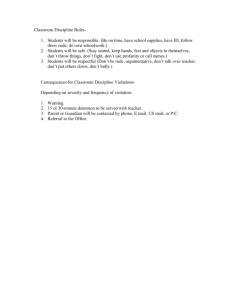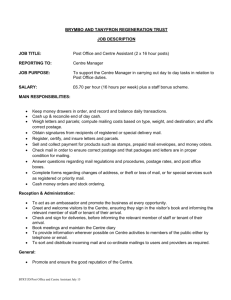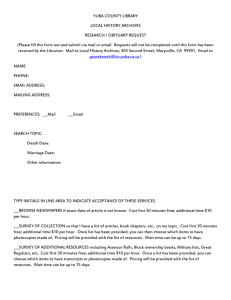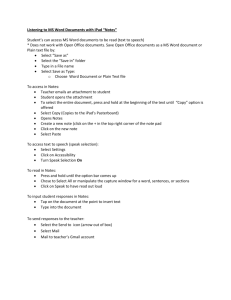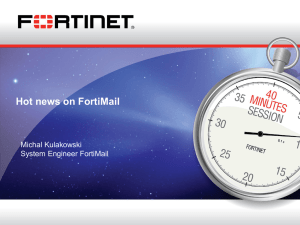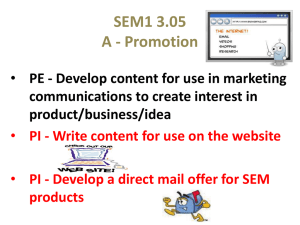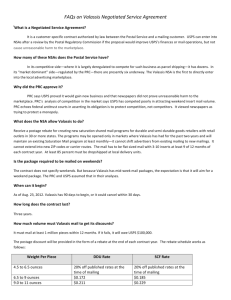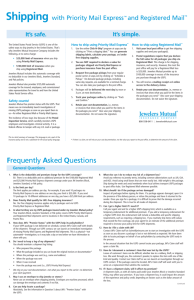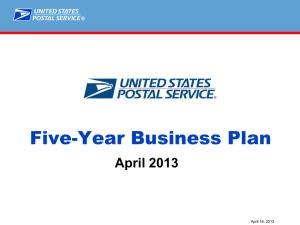Work Schedule Deviations - St Louis Gateway District Area Local
advertisement
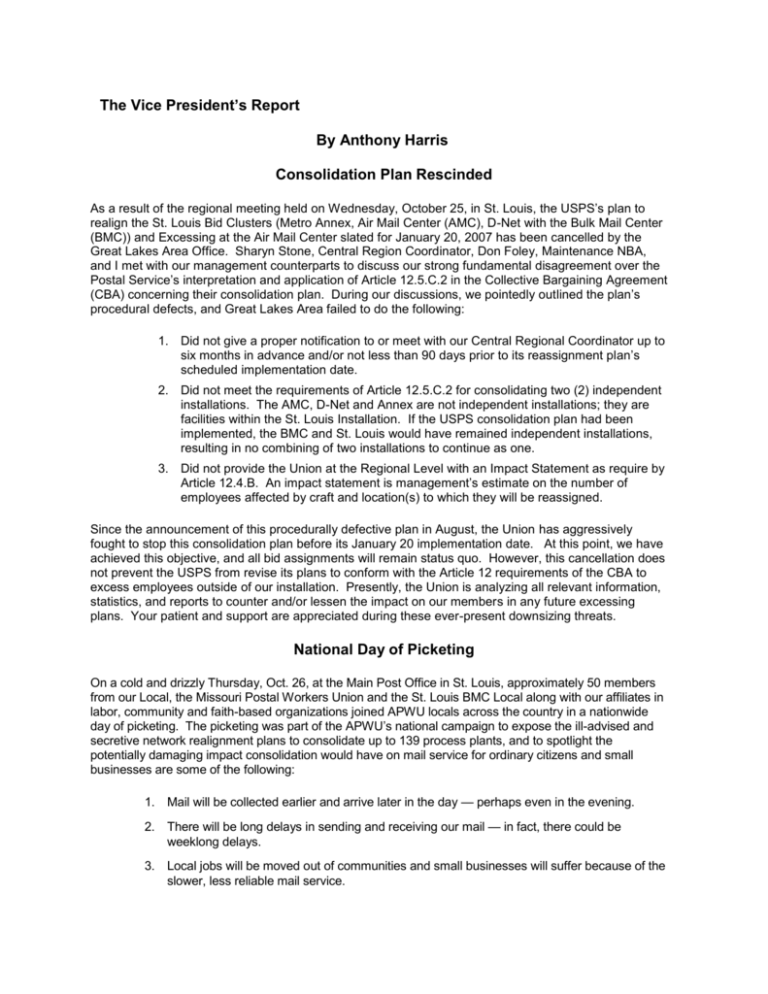
The Vice President’s Report By Anthony Harris Consolidation Plan Rescinded As a result of the regional meeting held on Wednesday, October 25, in St. Louis, the USPS’s plan to realign the St. Louis Bid Clusters (Metro Annex, Air Mail Center (AMC), D-Net with the Bulk Mail Center (BMC)) and Excessing at the Air Mail Center slated for January 20, 2007 has been cancelled by the Great Lakes Area Office. Sharyn Stone, Central Region Coordinator, Don Foley, Maintenance NBA, and I met with our management counterparts to discuss our strong fundamental disagreement over the Postal Service’s interpretation and application of Article 12.5.C.2 in the Collective Bargaining Agreement (CBA) concerning their consolidation plan. During our discussions, we pointedly outlined the plan’s procedural defects, and Great Lakes Area failed to do the following: 1. Did not give a proper notification to or meet with our Central Regional Coordinator up to six months in advance and/or not less than 90 days prior to its reassignment plan’s scheduled implementation date. 2. Did not meet the requirements of Article 12.5.C.2 for consolidating two (2) independent installations. The AMC, D-Net and Annex are not independent installations; they are facilities within the St. Louis Installation. If the USPS consolidation plan had been implemented, the BMC and St. Louis would have remained independent installations, resulting in no combining of two installations to continue as one. 3. Did not provide the Union at the Regional Level with an Impact Statement as require by Article 12.4.B. An impact statement is management’s estimate on the number of employees affected by craft and location(s) to which they will be reassigned. Since the announcement of this procedurally defective plan in August, the Union has aggressively fought to stop this consolidation plan before its January 20 implementation date. At this point, we have achieved this objective, and all bid assignments will remain status quo. However, this cancellation does not prevent the USPS from revise its plans to conform with the Article 12 requirements of the CBA to excess employees outside of our installation. Presently, the Union is analyzing all relevant information, statistics, and reports to counter and/or lessen the impact on our members in any future excessing plans. Your patient and support are appreciated during these ever-present downsizing threats. National Day of Picketing On a cold and drizzly Thursday, Oct. 26, at the Main Post Office in St. Louis, approximately 50 members from our Local, the Missouri Postal Workers Union and the St. Louis BMC Local along with our affiliates in labor, community and faith-based organizations joined APWU locals across the country in a nationwide day of picketing. The picketing was part of the APWU’s national campaign to expose the ill-advised and secretive network realignment plans to consolidate up to 139 process plants, and to spotlight the potentially damaging impact consolidation would have on mail service for ordinary citizens and small businesses are some of the following: 1. Mail will be collected earlier and arrive later in the day — perhaps even in the evening. 2. There will be long delays in sending and receiving our mail — in fact, there could be weeklong delays. 3. Local jobs will be moved out of communities and small businesses will suffer because of the slower, less reliable mail service. 4. Many local postmarks could be lost. In 2005, Government Accountability Office (GAO) published a report that found that the Postal Service’s mail processing infrastructure realignment strategy lacks "sufficient transparency and accountability, excludes stakeholder (citizens) input, and lacks performance measures for results”. Why would the USPS develop a major realignment plan that lacks measurable goals and objectives? Is there a hidden agenda? Based upon GAO report, it is not surprising that the USPS’s consolidation plan puts the interest and profits of corporate advertising mailers ahead of the needs of individual postal customers and small businesses. In fact, the large corporate advertising mailers were very influential in devising this plan. These greedy corporations pre-sort their mail and this plan will make it easier and cheaper for them to operate. Therefore, big special interests get large profits while the ordinary citizens get slower, less efficient and eventually more expense mail service. Specifically, our informational picketing gave us the opportunity to publicly express these and other concerns as well as to engage, educate, and inform the consumers how they can take empowering actions to protect the reliable and efficient service that they are currently receiving. During the picket, we distributed “Don’t Let Our Mail Service Fall Apart” flyers and post cards to public. We are asking the citizens to mail these postcards to their congressional representatives to voice their concerns and opposition to the current attack on our mail service. Nationally, our goal is to send 2 million post cards to Members of Congress. This will be an ongoing campaign; the Union is asking every member to be proactive in this effort and call the toll free action line at 1-8-777 OUR MAIL (687-6245) to get the Save Our Service packet. This packet contains several “Don’t Let Our Mail Service Fall Apart” postcards that are to be given, completed and returned to you by your family members, friends, neighbors, and affiliated organizations. Now, all you have to do is return them in the pre-paid postage envelope to the Save Our Service office in Washington, DC, and APWU will forward them to our Senators and Congressmen. This small request will be beneficial and effective in APWU”s organized campaign to politically save our service as well as our jobs. The job you save may be yours! Work Schedule Deviations Recently, the Sr. Plant Manager sent the Union a letter reminding us of the Gateway Performance Cluster’s Work Schedule Policy. It stated that employees are prohibited from leaving the building while on the clock, except when authorized to do so, such as, to utilize authorized smoking areas while on a scheduled break. Furthermore, this manager wrote that some employees are leaving their work assignments and the building without prior authorization to move their cars and/or feed their parking meters, etc. Consequently, I can only take this letter as a warning that management plans to closely monitoring employees’ 10-minute breaks and other work activities. Also, I am reading into this letter that any deviations (extended breaks, unauthorized absences from work assignments and/or leaving the building) will be cause for progressive discipline. The badge reader system can electronically track your movement whenever it is necessary for you to swipe your identification (ID) badge to enter and/or exit an area. Every badge swipe has its time and location logged into the badge reader’s computer system. Periodically, this recorded information has been used to discipline to employees. My advice is to follow your work assignment’s schedule, and other than bathroom and scheduled breaks, notify the appropriate management official when it is necessary for you to leave your work area.
